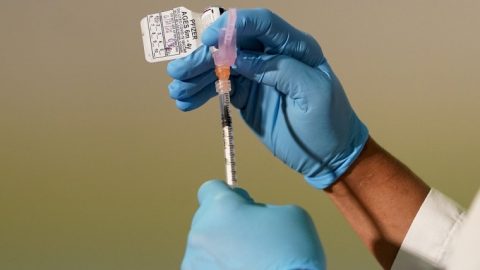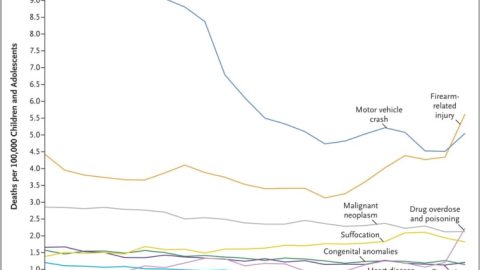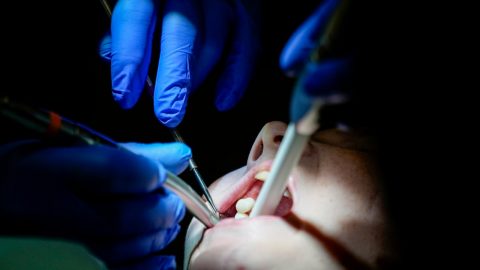Joe Biden’s age, 79, automatically puts him at greater risk for Covid complications, but infectious disease experts expect the president — who has had two Covid booster vaccines and is in relatively good health otherwise — to recover quickly.
Biden tested positive for Covid on Thursday and has mild symptoms, including fatigue, runny nose and a dry cough, according to a letter from Dr. Kevin O’Connor, the president’s physician.
“He is a healthy 79-year-old man who has been diagnosed rapidly, who’s having mild symptoms, who’s vaccinated and is on antiviral therapy. All of us expect a good outcome,” said Dr. Arturo Casadevall, a professor of medicine at the Johns Hopkins School of Medicine.
White House Covid response coordinator Dr. Ashish Jha said in a briefing that the president “feels really well,” has no fever and was working all morning.
“Our expectation is that he’s going to continue to have mild illness, and he’s going to be monitored for symptoms,” he said.

Biden tested negative for Covid on Tuesday, so experts think he’s in the early stage of the illness.
“He probably got exposed over the weekend,” said Dr. Scott Roberts, a Yale Medicine infectious disease specialist. “The median incubation period of omicron is three days, so my guess is if his positive test was today, he probably got exposed on Sunday.”
The amount of virus in a person’s body, or viral load, is highest around when symptoms start, he said. So once Biden’s symptoms start to improve, he said, that will be a good indicator that he is on the mend.
Covid can be riskier for people ages 50 and older for several reasons, including that older adults are more likely to have underlying health issues. Vaccine protection also tends to be less robust in older people because the immune system weakens with age. Doctors will likely check Biden’s blood oxygen levels several times a day to watch for signs of pneumonia.
“That’s one of the most important things to be measured to make sure you’re not developing more serious disease down in the lungs,” said Dr. William Schaffner, an infectious diseases expert at Vanderbilt University Medical Center.
He said it’s unlikely the president will develop pneumonia because omicron tends to result in upper respiratory illness.
“The virus gets to the back of your throat and causes inflammation in those local tissues,” Schaffner said. “That irritation causes the cough, the runny nose, the sore throat.”
“I wouldn’t be surprised if he’s hoarse for a couple of days,” he added.
What’s next for Biden
Biden is taking Paxlovid, an antiviral treatment consisting of three pills taken twice daily for five days. Disease experts think the drug works better the earlier it’s administered.
“His viral load is probably already going down on the Paxlovid, and I suspect at this point he’ll probably continue to improve,” Roberts said.
A minority of people who take Paxlovid see symptoms rebound shortly after finishing the medication. They may test positive again, but experts said in those cases, the disease tends to come back milder and people usually do not develop new complications. Roberts said doctors should know if Biden experiences a Paxlovid rebound within a day or two after he stops the medication.
Jha said Biden takes Eliquis, a blood thinner, and Crestor, a cholesterol-lowering medication, both of which must be stopped during the Paxlovid treatment. Paxlovid contains a drug called ritonavir, which slows the speed at which the body breaks down medications. Statins like Crestor are processed by the liver, so a slower metabolism may lead to a buildup of the drug in the body.
Experts said there is a chance that Biden develops long Covid — symptoms that last several months or longer — but that risk is diminished by the fact that he is vaccinated, double boosted and taking an antiviral.
“I think once his isolation period comes to an end, a good thing to look for is, is he bouncing straight back up and being interactive again? Or does it take him a little bit longer, as it does for some people?” said Dr. Cameron Wolfe, an infectious diseases expert and associate professor of medicine at Duke University School of Medicine.
There is no evidence to suggest that the predominant variant circulating — BA.5 — causes more severe illness than earlier variants. It is, however, much more contagious and better at evading immune protection from vaccines or prior infections. Still, vaccines and treatments like Paxlovid continue to work well against it, experts said.
If Biden were to start feeling more ill, other treatment options are available, including oxygen support, steroids and the antiviral remdesivir. One monoclonal antibody, bebtelovimab, is demonstrated to be effective against BA.5 as well.
These defenses weren’t available the last time a president had Covid.
“Think about when President Trump got it,” Casadevall said. “He had not been immunized, there was no Paxlovid at the time, and he ended up being hospitalized. In a short two years, we have vaccines available and we have antivirals available. I think that’s something to celebrate.”









Recent Comments